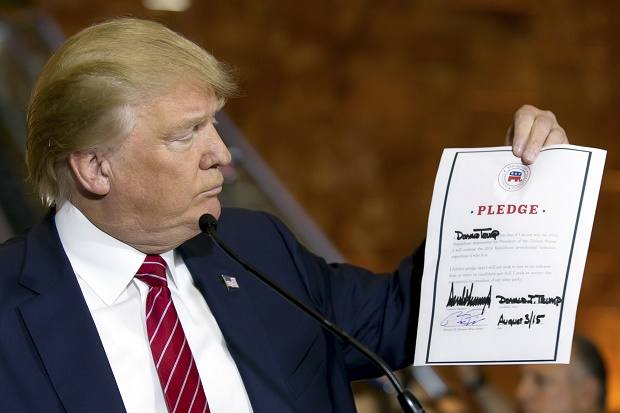Trump: North American trade deal a ‘disaster,’ says he’d ‘break’ it

In this Thursday, Sept. 3, 2015, photo, Republican presidential candidate Donald Trump looks at a signed pledge during a news conference in Trump Tower in New York. It was a chaotic summer for the unruly pack of 17 major Republican presidential contenders. Trump rocketed into front-runner status and has shown remarkable staying power. Can he keep it up when voters start paying more attention? AP
WASHINGTON — Republican presidential front-runner Donald Trump says he wants to be able to slap tariffs on US companies that choose to make their products overseas, and he’s willing to violate existing trade deals to do it.
In an interview with CBS’ “60 Minutes” that will be broadcast Sunday, the billionaire businessman says if elected president he won’t be stopped by deals such as the North American Free Trade Agreement, the landmark Clinton-era free trade agreement between the US, Canada and Mexico.
“We will either renegotiate it or we will break it,” Trump said, panning it as “a disaster.”
“Every agreement has an end,” he said. “Every agreement has to be fair.”
A look at Trump’s proposal, and the ramifications of breaking existing trade deals, according to experts:
Article continues after this advertisementCould Trump ‘break’ a trade deal?
Article continues after this advertisementNAFTA governs trade between the US, Canada and Mexico. The US is allowed to withdraw from the agreement, so long as it provides six months’ notice, said Douglas Irwin, a professor of economics at Dartmouth and an expert on US trade policy.
But there is disagreement among experts about whether Congress would need to sign off on such a move, an echo of questions about whether the next president could abandon the deal with Iran over that country’s nuclear program.
There is no question that Congress would need to approve any kind of import tariffs Trump might want to slap on products made by companies that move jobs overseas. In his interview with “60 Minutes,” Trump cites his desire to do so, using his favorite example — Ford Motor Co. moving production of some autos from the US to Mexico.
“If they want to sell that car in the United States, they pay a tax,” he said. “Here’s what’s going to happen: They’re not going to build their plant there. They’re going to build it in the United States.”
What would happen if the US quit NAFTA?
While many have raised concerns about the economic impact of NAFTA since it was ratified, experts said there was no precedent for walking away from such an expansive deal.
“It would be unbelievably, extraordinarily complicated,” said Edward Alden, a senior fellow at the Council on Foreign Relations and an expert in trade policy. He warned of tremendous consequences for business.
“You have thousands and thousands of businesses on both sides of the border that are set up to operate the way they are because the rules of NAFTA exist,” he said, “so it’s not the kind of thing you could just pull the plug on overnight.”
Thomas Bollyky, a former trade negotiator who is also a senior fellow at the Council on Foreign Relations, called Trump’s plan both unwise and unnecessary.
Bollyky said that pulling out of NAFTA would have ramifications that extend far beyond trade, putting into question other agreements negotiated by presidents — including the nuclear deal with Iran.
“If we start breaking them and withdrawing from them, people no longer trust our word in those agreements,” he said.
Irwin said that any effort by the president to start slapping tariffs on other countries could also come back to bite the US
“It would have enormous repercussions for US trade, because if the US followed through, I’m sure other countries would retaliate,” he said. Mexico, for instance, might scale back its purchase of US goods to compensate for new import tariffs, he said.
“We’re sort of shooting ourselves in the foot to some extent,” he said.
Is Trump’s idea even necessary?
Trump is far from the first presidential candidate to express concern about NAFTA. President Barack Obama, for one, was a frequent critic when he was first running for president in 2008.
But experts said that a renegotiation of some of NAFTA’s terms is, in many ways, going on now as negotiations continue on the Trans-Pacific Partnership. That trade deal involves both Canada and Mexico and will supersede parts of NAFTA, they said.
Alden said that the new deal would impact areas of trade that include autos.
Added Bollyky, “It would be really hard to see what (abandoning NAFTA would) accomplish in this particular case given that we will have a new trade agreement with these countries with new terms.”
RELATED STORIES
Donald Trump not backing away from immigrant comments